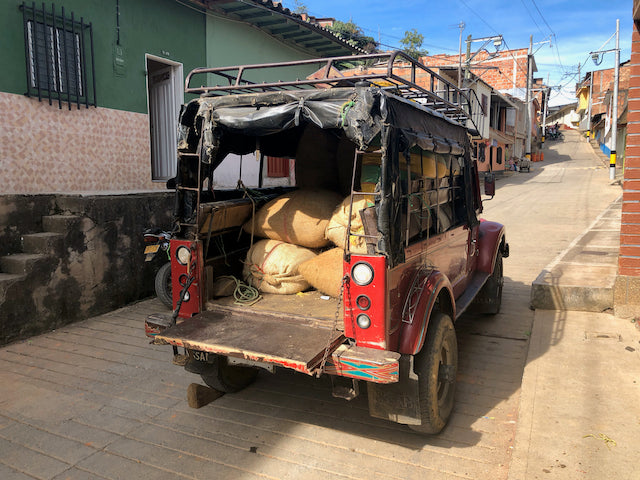At four hectares (about the size of Washington Square Park), Gachiru is among the smaller of Kenya's "estate" farms. Traditionally, farmers of this size or smaller do not operate their own postharvest processing equipment, but James operates a small wet-mill where he processes his own coffee, allowing traceability back to his small farm.
James's coffee is handpicked, pulped, then fermented without water for 12-24 hours. Afterwards it is washed in clean water to remove any remaining mucilage and the resulting parchment coffee is soaked in water for another 13 hours. It is then dried on raised platform beds for 14-21 days until it reaches a moisture content optimal for both flavor and longevity.
Our import partners for East Africa, Sucafina, operate Kahawa Bora, a tiny dry-milling line that was made to accommodate small lots like this one. This makes it possible for individual small-scale producers like James to sell their coffee with full traceability, something that is otherwise only possible with Kenya's larger estates.
Despite coffee's long history in neighboring Ethiopia, coffee production did not start in Kenya until the 1890s. Then, it was a colony under British occupation called the East Africa Protectorate. For those first few decades, the British controlled agricultural output and coffee production was shipped entirely to London for sale.
In 1933, the colonial government passed the Coffee Act, returning the sale of coffee to Kenya and founding the Kenyan Coffee Board, which established a set of universal quality standards and an auction system that is still used almost exclusively today. Largely because of the success of this auction, it can be challenging to source the same coffees from individual, small-scale producers on a year-after-year basis. This complicates our preferred practice of relationship sourcing, and we're actively brainstorming ways to forge consistent, perennial relationships with like-minded producers there.
Kenya's coffee is nearly exclusively of the varieties SL-28 and SL-34, named for Scott Agricultural Laboratories, which developed and distributed them in the 1930s and 1940s. Gachiru grows a mix of SL-28 and Batian, another Kenya-specific variety developed in 2010 for resistance against coffee berry borer beetles and coffee leaf rust.
James's coffee is handpicked, pulped, then fermented without water for 12-24 hours. Afterwards it is washed in clean water to remove any remaining mucilage and the resulting parchment coffee is soaked in water for another 13 hours. It is then dried on raised platform beds for 14-21 days until it reaches a moisture content optimal for both flavor and longevity.
Our import partners for East Africa, Sucafina, operate Kahawa Bora, a tiny dry-milling line that was made to accommodate small lots like this one. This makes it possible for individual small-scale producers like James to sell their coffee with full traceability, something that is otherwise only possible with Kenya's larger estates.
Despite coffee's long history in neighboring Ethiopia, coffee production did not start in Kenya until the 1890s. Then, it was a colony under British occupation called the East Africa Protectorate. For those first few decades, the British controlled agricultural output and coffee production was shipped entirely to London for sale.
In 1933, the colonial government passed the Coffee Act, returning the sale of coffee to Kenya and founding the Kenyan Coffee Board, which established a set of universal quality standards and an auction system that is still used almost exclusively today. Largely because of the success of this auction, it can be challenging to source the same coffees from individual, small-scale producers on a year-after-year basis. This complicates our preferred practice of relationship sourcing, and we're actively brainstorming ways to forge consistent, perennial relationships with like-minded producers there.
Kenya's coffee is nearly exclusively of the varieties SL-28 and SL-34, named for Scott Agricultural Laboratories, which developed and distributed them in the 1930s and 1940s. Gachiru grows a mix of SL-28 and Batian, another Kenya-specific variety developed in 2010 for resistance against coffee berry borer beetles and coffee leaf rust.






Leave a comment
This site is protected by hCaptcha and the hCaptcha Privacy Policy and Terms of Service apply.